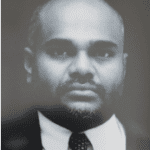My first day at the Attorney General’s office had arrived. I was young, inexperienced, and full of energy. I had earned a Bachelor of Laws and a Masters of Comparative Laws from the International Islamic University in Malaysia.
State Attorney was the title given to all attorneys at the time who worked as state representatives in a variety of positions, including mine. State attorneys located in Male and atoll attorneys based in several atolls were the two types of attorneys employed by the Attorney General’s office (only a handful of the 20 atolls had such attorneys then).

The Attorney General, Dr. Mohammed Munavvar, was my superior. He was one of the first law graduates in the nation and the first to receive a Ph.D. in law. He completed legal studies in Canada and Russia. His family is very well-educated. Dr. Munavvar and I both come from the southernmost atoll in the Maldives archipelago, Addu Atoll.
The Attorney General served as the primary prosecutor, the top legal adviser to the executive branch, and a member of the Cabinet. Additionally, Dr. Munavvar was a member of parliament for the Addu Atoll district. In those days, the People Assembly, also known as the Rayyithunge Majlis or just the Parliament, had two representatives chosen by each Atoll.
Dr. Munavvar was a friendly, easy going and laidback person. His easygoing nature meant he was always late for daily briefings and other office meetings.
He “lectured” me for almost an hour and a half on a variety of topics on my first day of work, including what he expected of me. I left the meeting feeling upbeat, with a sense of being the “chosen one”. Nothing gave any indication of the challenging route that lay ahead.
In those days, there was approximately 15 attorneys working at the Attorney General’s office. Many of them had law degrees from Western Universities. Some of them had studied with me at the International Islamic University in Malaysia, including Dr. Munavvar’s brother, Mr. Suood (currently the Justice of the Supreme Court).
The office of the attorney general was in charge of drafting laws for the government, evaluating government contracts, giving legal advice to various government departments, and prosecuting criminal offenses. While the remaining duties were allocated to more senior and experienced attorneys, prosecutorial duty was given to less experienced attorneys. Attorneys who lost Dr. Munavvar’s favor also ended themselves working in the prosecution division, prosecuting minor crimes.
During one of our daily briefings, we had a very memorable encounter. A prisoner was accused of insulting Islam with his language. From his cell in prison, he penned a letter to the deputy defense minister (Defense Minister being the President Gayyoom himself). It said:
“To the Junior Lord next to the Highest Lord Anbari Abdul Sattar
This lowly slave is no longer able to endure the constant torture inflicted upon him by subordinate lords acting under your orders….”
އެންމެ ބޮޑު ކަލާނގެ ދަށުގައިވާ ކުޑަކަލާނގެ އަންބަރީ އަބްދުއްސައްތާރަށް
ވެދުން ސަލާމަށް ފަހު ދަންނަވަމެވެ
ތިޔަ ކަލާނގެ ދަށުގައިވާ ކުދިކުދި ކަލާނގެތައް މިއަޅާއަށްދޭ އަޒާބުން މިއަޅާ މިންޖުކުރައްވާދޭވެ
The individual continued by venting his anger at spending 75 days in solitary confinement and torture in poetic language. Authorities believed that the letter’s language called for a criminal inquiry and extra charges. There was no need for a dialogue, an investigation, or even a response about his allegedly tortured detention, arbitrary arrest, or solitary incarceration. He was accused of violating Penal Code Section 88(a). This specific Code clause was a one-size-fits-all type of provision. The highest penalty for violating “any legal or religious order” was six months in prison, exile, house detention, or a fine of up to 150 rufiyaa. Under this clause, it is impossible to avoid any charges. Furthermore, it is difficult to think of anything in the world that would not fall under this category of offences.
Back then, criminal investigations were simple.
The Ministry of Defense, Atoll Offices, and Island Offices investigated criminal cases. Serious cases were more often than not, referred to the Ministry of Defense in Male for investigation. The police and military were both under the command of the Defense Minister. There was no discernible distinction between these two forces and their functions. Authorities had the power to arrest and detain people as they saw fit. There was no need for a court order. Legal counsel was not permitted.
Investigators would summon or arrest individuals suspected of offences and question them in any manner they pleased. At the end of their investigation, officers would prepare statements [often confessions]. Once a suspect signed a confession statement, they could not retract it. Judges would not allow it. Any such attempt would result in perjury charges.
Two law enforcement officers could sign a statement claiming that a suspect actually delivered a confession statement but declined to sign it if they had been coerced into signing one. This proof was enough for lawyers to frame charge and for judges to find the suspect guilty.
Clearly, there was no way a suspect could get away. The system was geared for 100% conviction.
….And prosecution was even easier.
Attorneys need only read the charge sheet and sit down. The judge will then ask the accused [who was required to stand throughout the proceedings] what he or she thought about the charges read aloud. If the accused accepts the charges, the judge will proceed with the sentencing. If the accused denied the charges, the judge would then direct the attorney to read the statement he or she made during the investigation. The accused may claim that he or she did not give or sign any such statement. All such protests, however, will be futile in the face of investigation officers’ statements stating that the accused did in fact, give the statement, but declined to sign! Because the procedure was so predictable, some judges wrote decisions even before the hearing began.
It was a travesty of justice. Accused had no legal standing. There was no access to a lawyer during the investigation or even during the trial. They couldn’t even obtain a copy of their own confessions! Only judges and the state attorneys had access to the court procedure code. Several judges maintained 100 percent conviction records, which they took pride in, equated non-conviction with belittlement of their employer and master – the government. Then, one day, the entire table flipped upside down. A sitting judge was arrested in his own courtroom, thrown in jail, questioned, and charged. I was assigned to handle the case, which turned out to be the second most memorable experience I had at the Attorney General’s Office [detailed in the following article].
